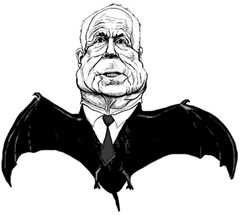
Jack is back, with 22 weeks of non-stop craziness. This time it's Islamic terrorists with five suitcase nukes, though the way the series works by the end of the season it will be Sri Lankan separatists with an anti-matter device. I have to say that I love the show, and thankfully it has gotten rid of the non-stop escalation of dangers that marked its first few seasons with each season poising an ever greater threat to the country. For a while there it was looking like Season 4 would begin with terrorists threatening to hurl the Earth into the sun, but they have instead wisely moved laterally with the intimidations.
I’m not the only one that enjoys the show. Plenty of people from the political right love it as well, as shown by the concern that the administration was writing the episodes this season, what with the nuke going off in the planned community of Valencia, California (home of Magic Mountain and the California Institute of the Arts). The main gist is the crazy amount of torture that goes on in the series, and the apparent justifications for it.
I find that odd, considering how the show actually portrays it. The argument is that 24 showcases the ‘ticking time bomb’ theory of relaxing restrictions on torture. But on the show, the restrictions aren’t relaxed; Jack just tortures anyway, when he ‘knows he’s right’; but the key point is that Jack is also willing to take responsibility for his actions. In seasons past he has allowed himself to be killed and revived, resigned his post, and exiled to prison in China; all as payback for his breaking the rules. He is perfectly willing to trade his job, freedom or even his life in exchange for what he feels to be a greater good – that of preventing the deaths of thousands or millions.
Jack has character, which the people in the administration and their supporters clearly lack. They want to be able to solve the ticking time bomb problem with no consequences, and that is their ultimate argument. Aside from the well documented problems with torture delivering information of dubious quality, the punishments given by laws against torture provide a powerful check on those who would do it. Do I really ‘know I’m right?’ And if you are, it’s simple moral calculus to trade some jail time for yourself to save the lives of millions of others. Of course if you’re wrong…
There was a somewhat simplistic ‘mind game’ proposed in a Law an Order episode a while back. The idea was that if Bin Laden were standing next to you in New York with a suicide nuclear bomb strapped to his chest and you had a gun, would you be a vigilante and shoot him, or would you call the police. They just posed the question, and never answered it; but calling the police is the only legal response, and for good reason. Vigilantism results in society breaking down with countless bad results. But in the Bin Laden scenario, the correct response is to shoot the guy, and turn yourself in. Going to jail for several years is an easy trade for the lives of thousands of others. But you turn yourself in, because we live in a country that is governed by the rule of law.


